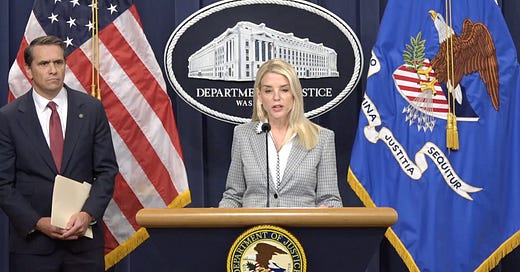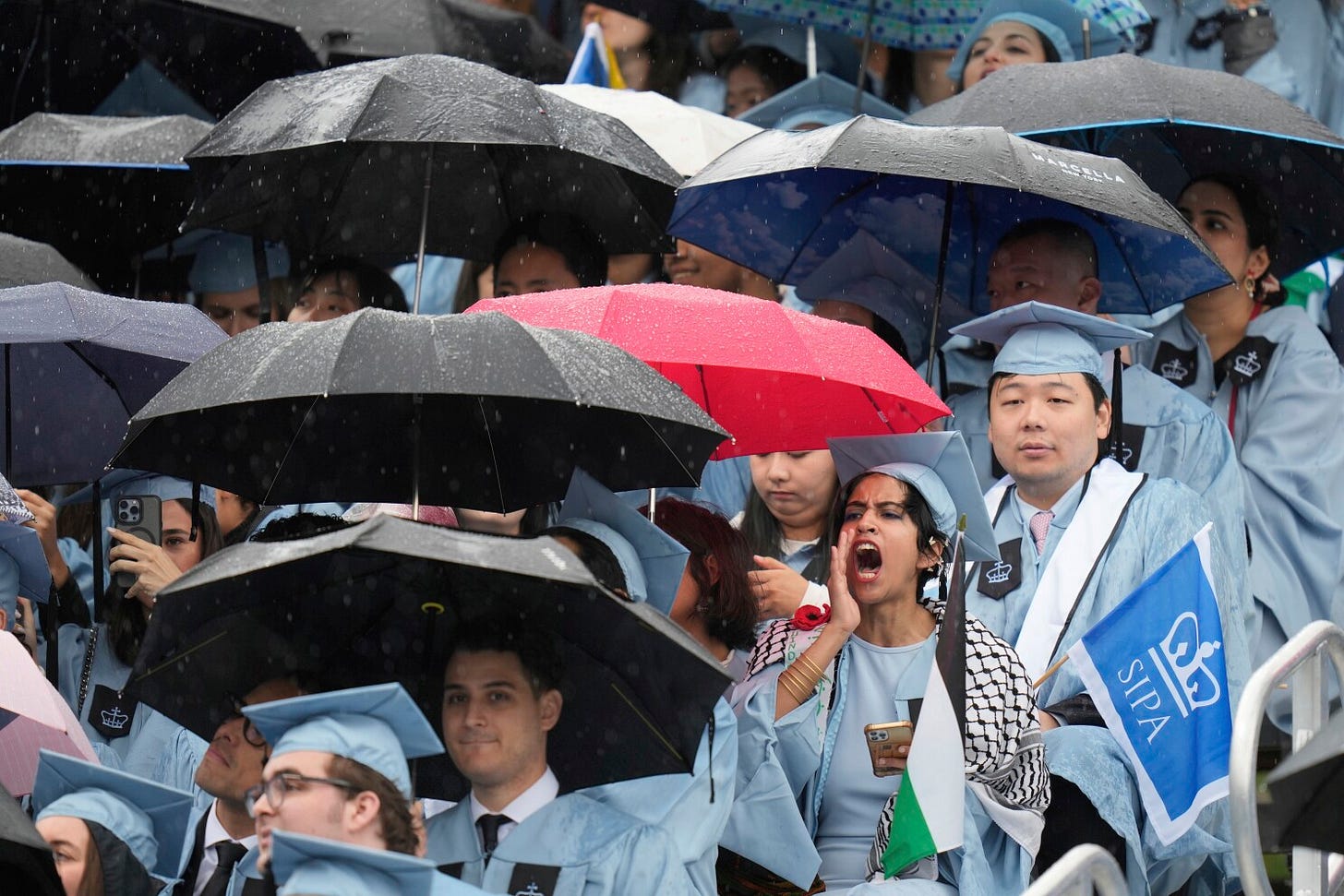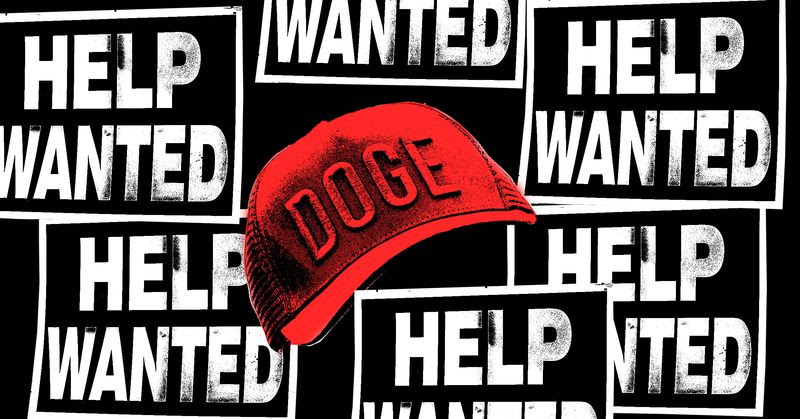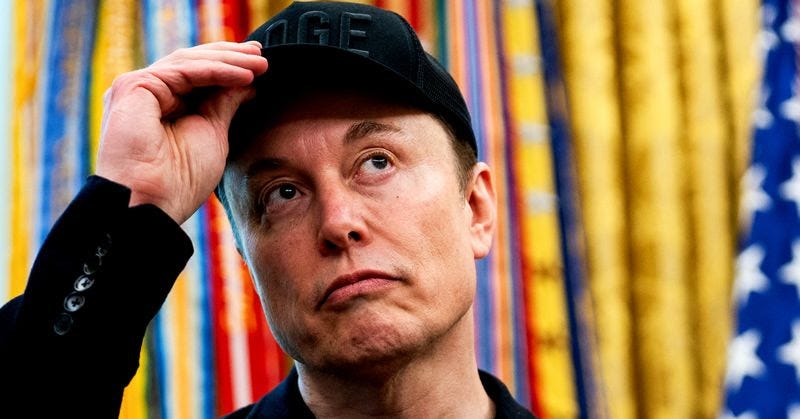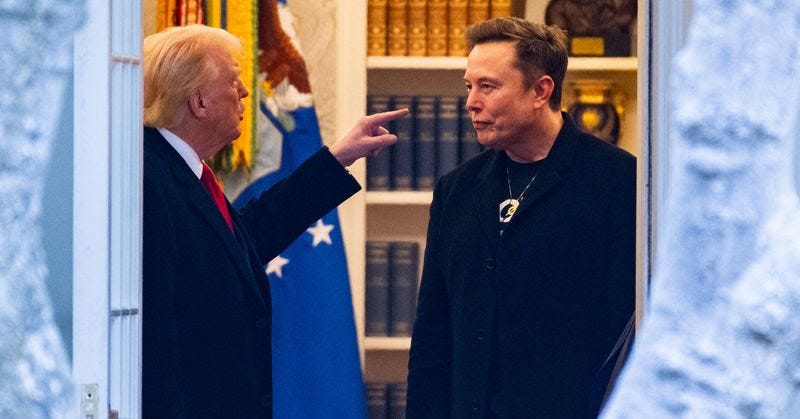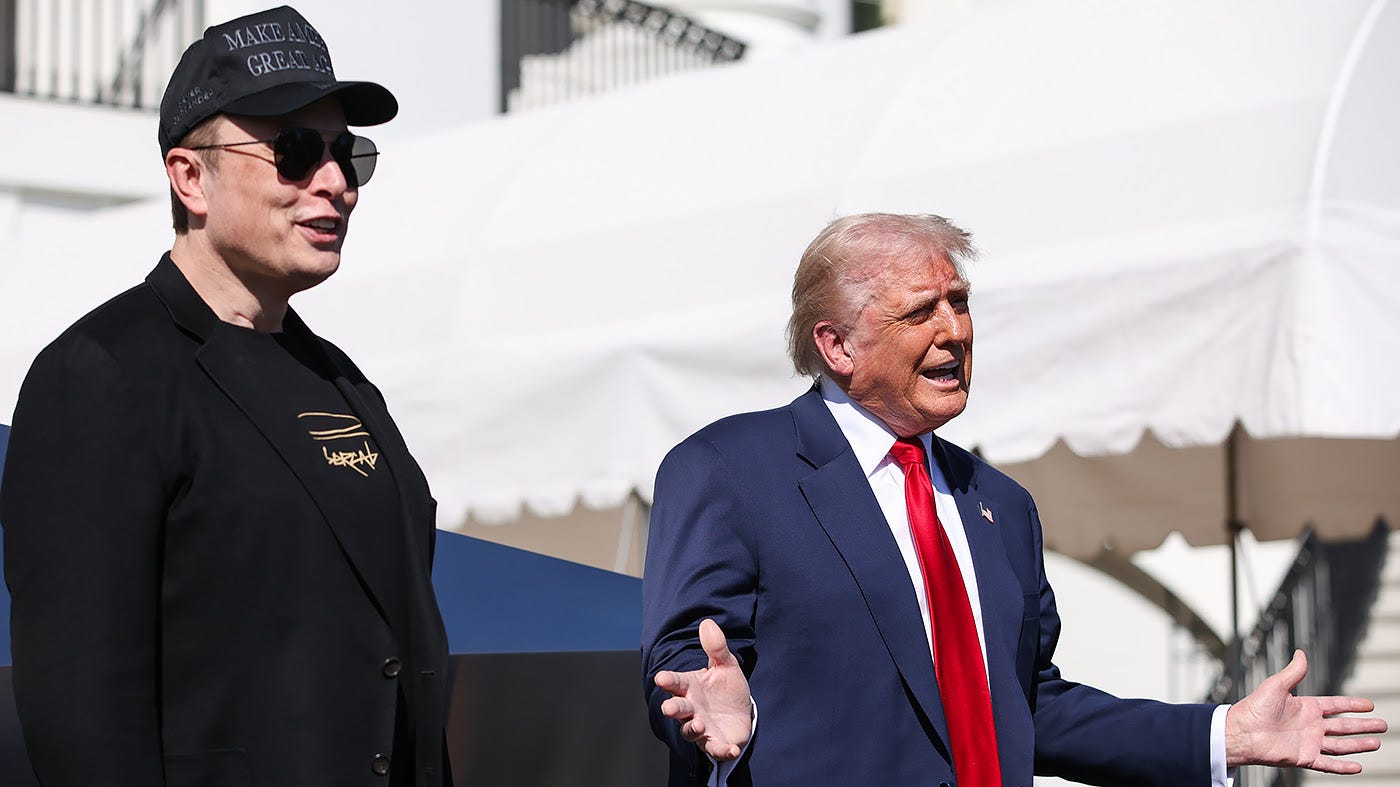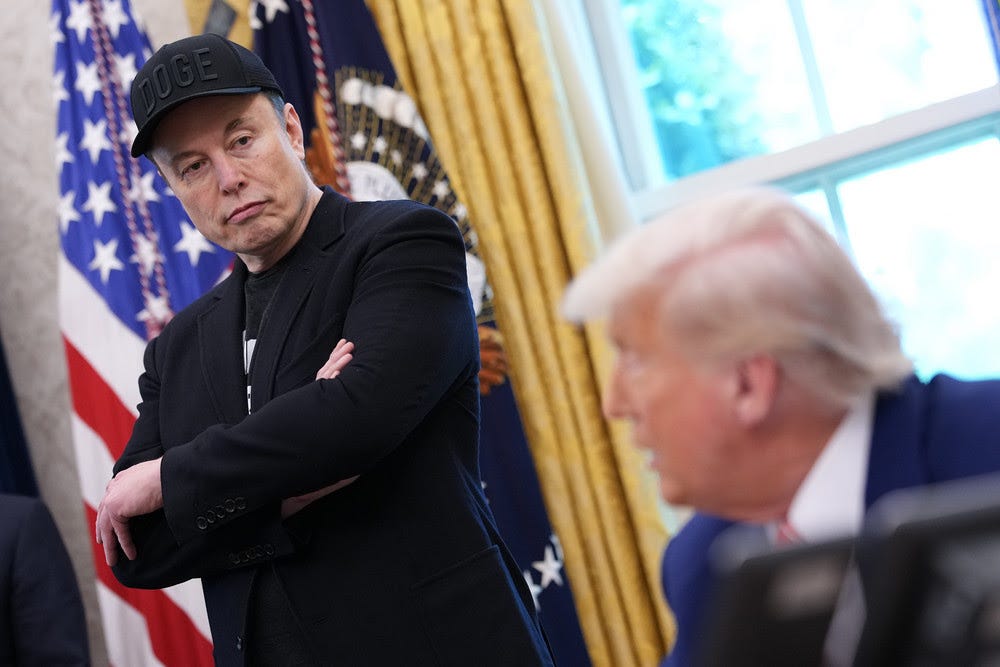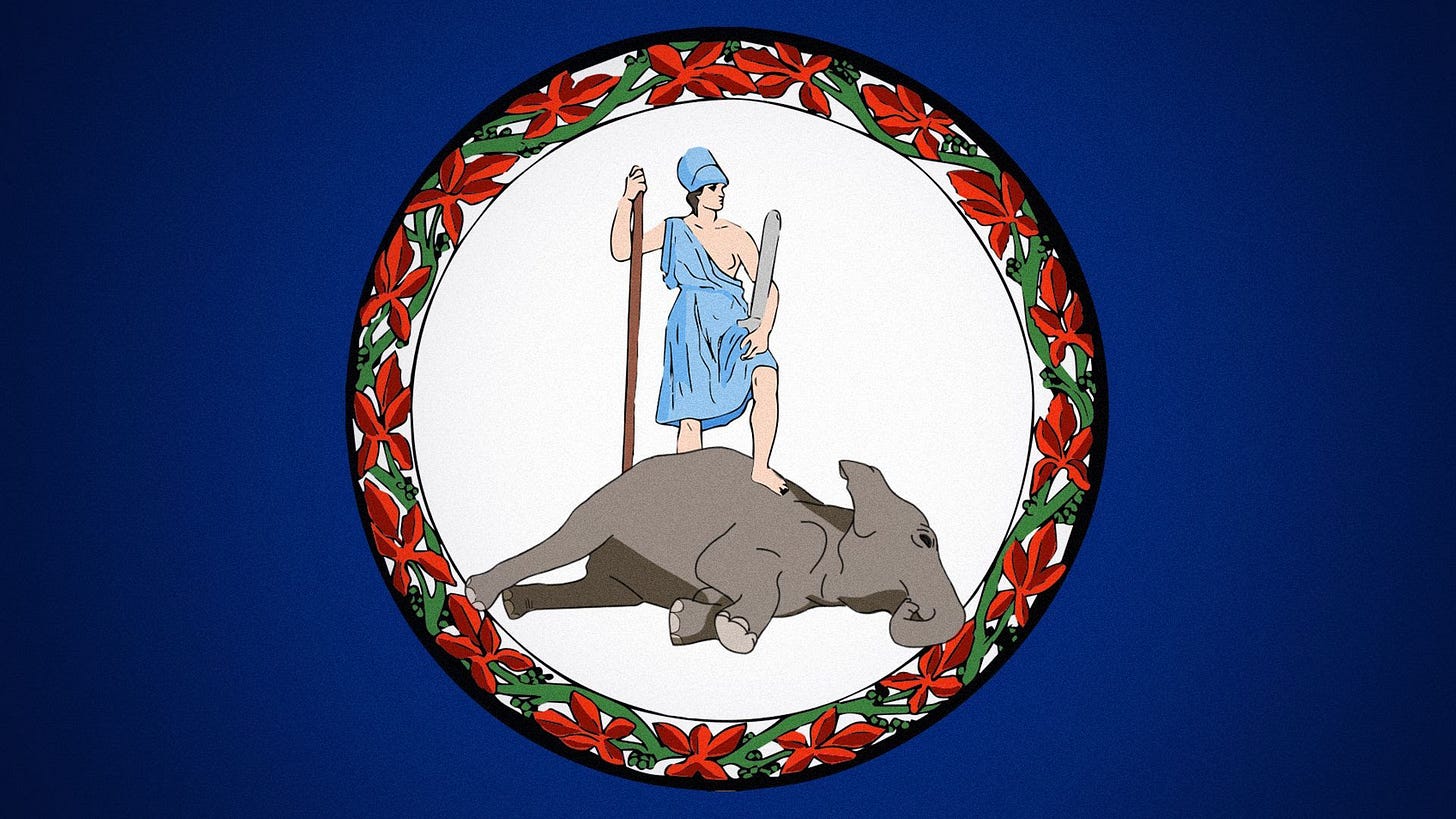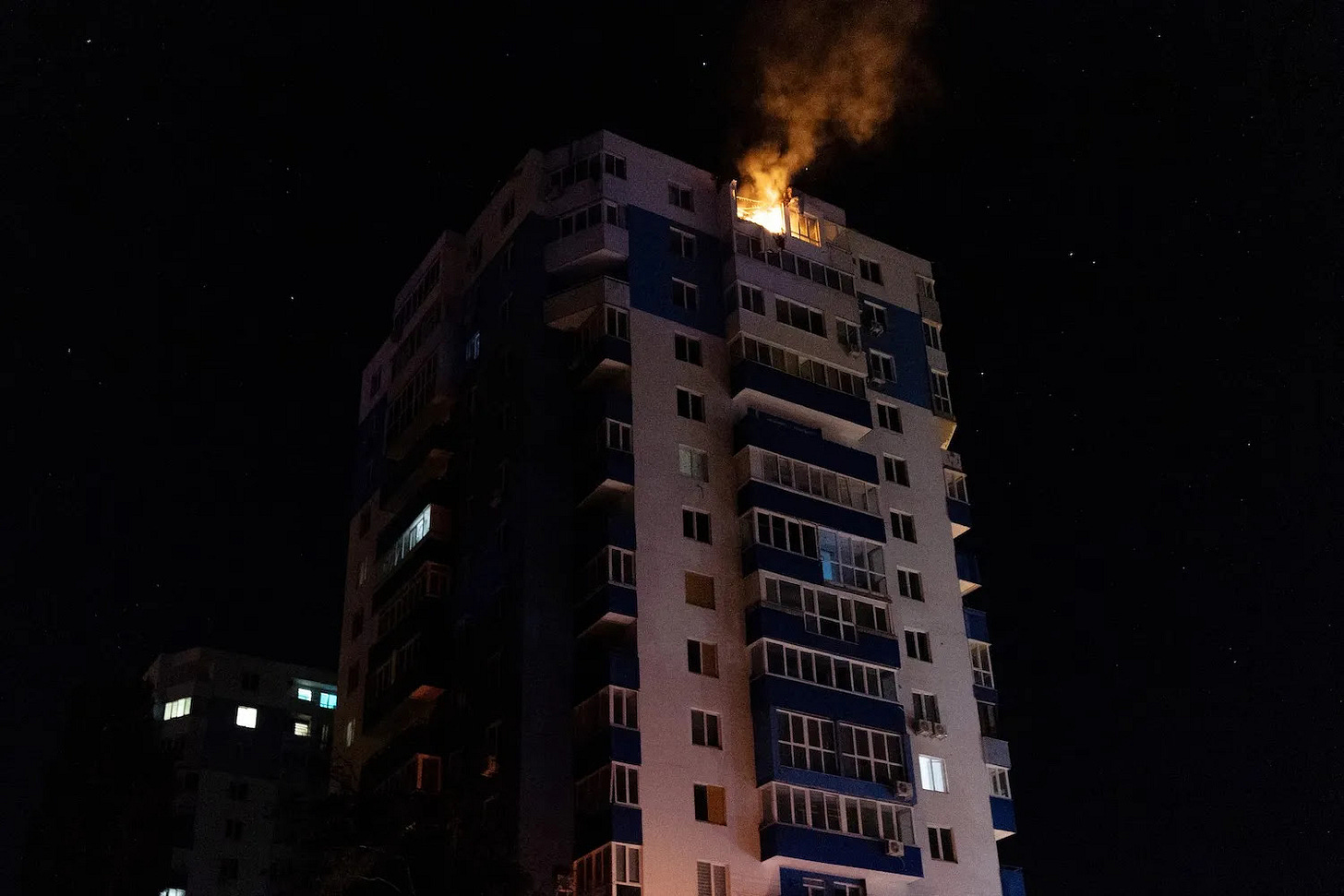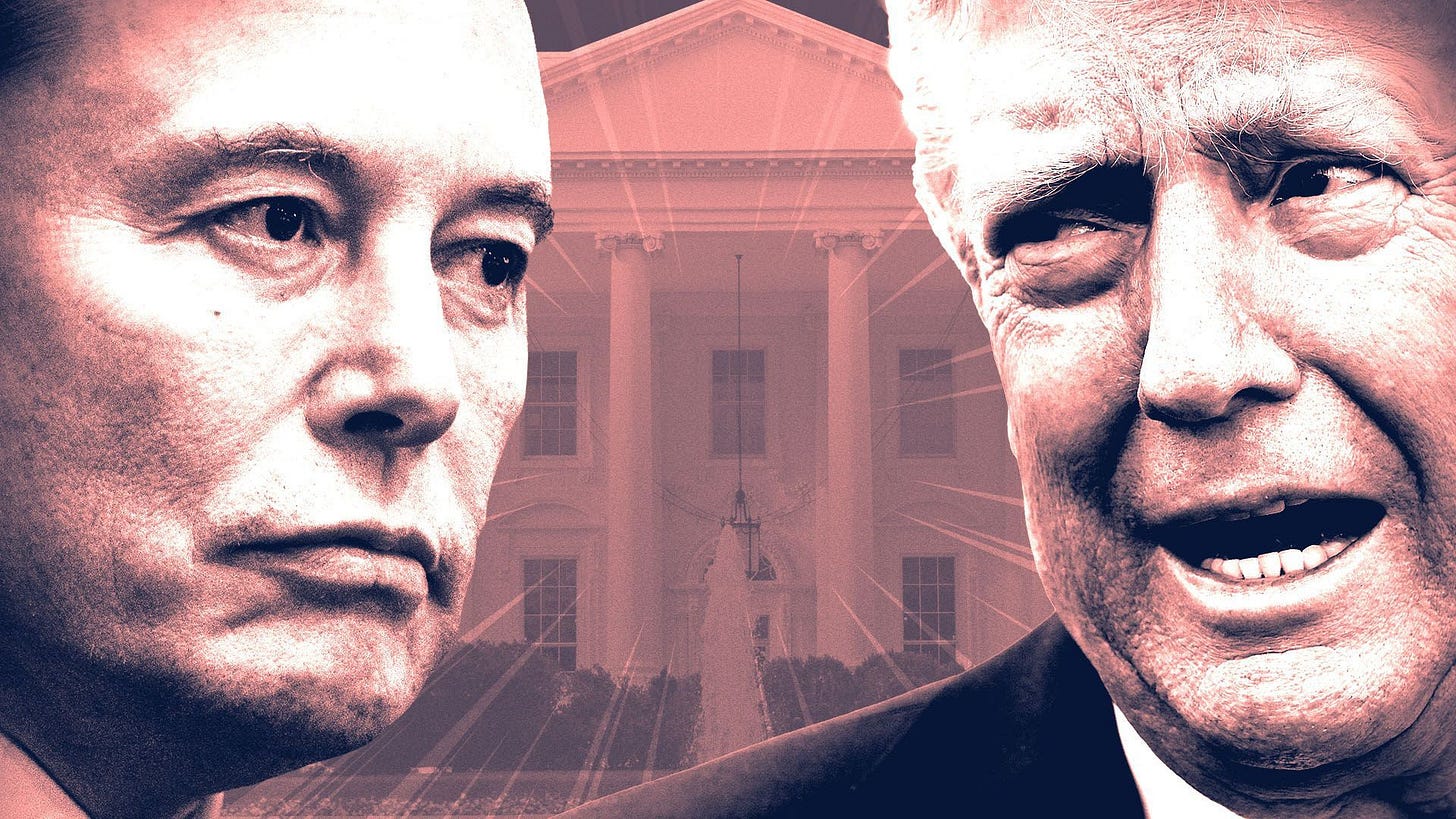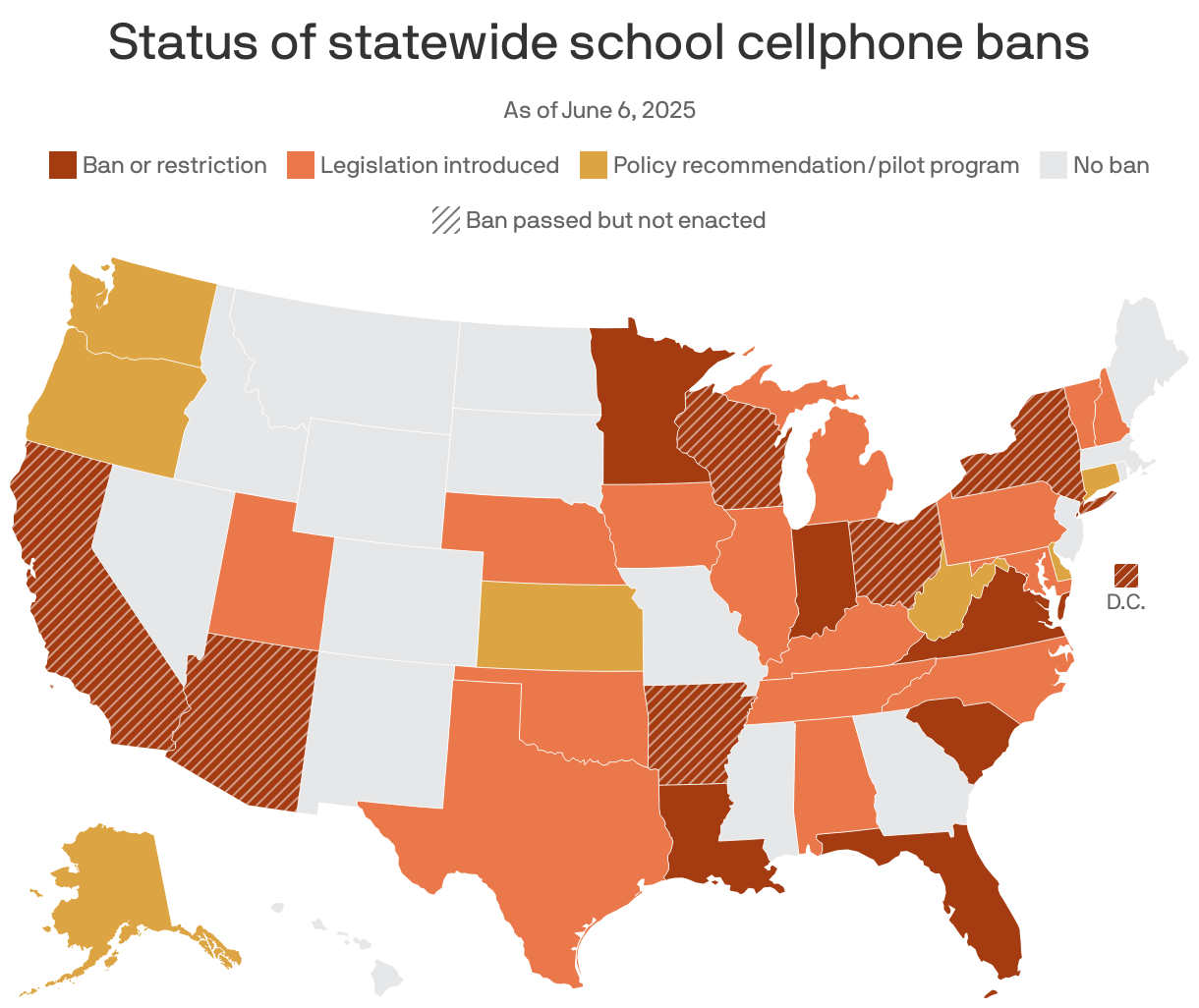Supreme Court Allows DOGE Access to Social Security Data
“The Supreme Court cleared the way for members of the Department of Government Efficiency, a cost-cutting group once led by Elon Musk, to access sensitive Social Security Administration records.
Granting an emergency request by the Trump administration, the justices lifted a lower court order that for now had barred DOGE employees or affiliates from accessing the agency’s systems and directed them to delete personal information they already had gathered.”
Read More at Wall Street Journal
Immigration
“The Trump administration retrieved the man it had wrongly deported to El Salvador, Kilmar Abrego Garcia. His return to the U.S. could end the administration’s most prominent court battle over its deportations.
As part of the return, federal prosecutors charged Abrego Garcia with transporting undocumented immigrants. ‘Abrego Garcia has landed in the United States to face justice,’ Attorney General Pam Bondi said.
Federal agents in Los Angeles used military-style force, including flash-bang grenades, to disperse an angry crowd that had formed as the agents conducted an immigration raid.” [New York Times]
1 big thing: Abrego Garcia returned to U.S. for trial
Screenshot: Justice Department news conference
“Kilmar Abrego Garcia is back on U.S. soil, where he will stand trial on criminal charges, Attorney General Pam Bondi announced this afternoon.
Why it matters: Abrego Garcia's case has become a flashpoint in President Trump's immigration crackdown as well as his administration's showdown with the courts.
What they're saying: A grand jury indicted Abrego Garcia on charges that he helped transport undocumented migrants within the U.S., Bondi said.
She said during a news conference that his ‘full-time job’ was trafficking people, drugs and weapons, and accused him of abusing undocumented women.
Bondi said she anticipates that Abrego Garcia will be deported to El Salvador again after serving his sentence, if he's convicted, calling him ‘a danger to our community.’
The administration is finally doing what the Supreme Court told it to do in April — take steps to ‘facilitate’ Abrego Garcia's return to the U.S. and make a formal, legal case for deporting him.
The courts haven't said Abrego Garcia is innocent — only that the administration needs to provide some form of due process before shipping people off to a Salvadorian prison. A trial would meet that standard.
‘This is what American justice looks like,’ Bondi said.” [Axios]
Detained Columbia graduate claims ‘irreparable harm’ to career and family as he pleads for release

“NEW YORK (AP) — A Columbia graduate facing deportation over his pro-Palestinian activism on campus has outlined the ‘irreparable harm’ caused by his continued detention as a federal judge weighs his release.
Mahmoud Khalil said in court filings unsealed Thursday that the ‘most immediate and visceral harms’ he’s faced in his months detained in Louisiana relate to missing out on the birth of his first child in April.
‘Instead of holding my wife’s hand in the delivery room, I was crouched on a detention center floor, whispering through a crackling phone line as she labored alone,’ the 30-year-old legal U.S. resident wrote. ‘When I heard my son’s first cries, I buried my face in my arms so no one would see me weep.’
He also cited potentially ‘career-ending’ harms from the ordeal, noting that Oxfam International has already rescinded a job offer to serve as a policy adviser.
Even his mother’s visa to come to the U.S. to help care for his infant son is also now under federal review, Khalil said.
‘As someone who fled prosecution in Syria for my political beliefs, for who I am, I never imagined myself to be in immigration detention, here in the United States,’ he wrote. ‘Why should protesting this Israel government’s indiscriminate killing of thousands of innocent Palestinians result in the erosion of my constitutional rights?’
Over boos, Columbia University president notes Mahmoud Khalil's absence at graduation
Department of Homeland Security spokesperson Tricia McLaughlin responded that Khalil should simply self-deport, taking advantage of the administration’s offer of $1,000 and a free flight to those in the country illegally that use its CBP Home app. Khalil obtained a green card, but the Trump administration says it is revoking it.
Khalil’s 13-page statement was among a number of legal declarations his lawyers filed highlighting the wide-ranging negative impacts of his arrest.
Dr. Noor Abdalla, his U.S. citizen wife, described the challenges of not having her husband to help navigate their son’s birth and the first weeks of his young life.
Students and professors at Columbia wrote about the chilling effect Khalil’s arrest has had on campus life, with people afraid to attend protests or participate in groups that can be viewed as critical of the Trump administration.
Last week, a federal judge in New Jersey said the Trump administration’s effort to deport Khalil likely violates the Constitution.
Judge Michael Farbiarz wrote the government’s primary justification for removing Khalil — that his beliefs may pose a threat to U.S. foreign policy — could open the door to vague and arbitrary enforcement.
Khalil was detained by federal immigration agents on March 8 in the lobby of his university-owned apartment, the first arrest under Trump’s widening crackdown on students who joined campus protests against Israel’s war in Gaza.” [AP News]
DOGE Is on a Recruiting Spree
BY MAKENA KELLY AND VITTORIA ELLIOTT | 2-MINUTE READ
“While Elon Musk and Donald Trump post through their breakup, DOGE shows no signs of slowing down—and potential recruits are being told they can make up to $195,000 a year.” [Wired]
Elon Musk’s Fight With Trump Threatens $48 Billion in Government Contracts
BY PARESH DAVE | 3-MINUTE READ
“The billionaire’s feud with the president over the nation’s debt is jeopardizing lucrative deals for SpaceX and other Musk companies.” [Wired]
Conspiracy World Thinks the Musk-Trump Breakup Is a ‘Psyop’
BY DAVID GILBERT | 3-MINUTE READ
“As Elon Musk and Donald Trump feuded, conspiracy theorists assured their followers it was all a show. ‘5D chess at its finest, baby—checkmate!’ proclaimed one.” [Wired]
‘100% Stupid’: MAGA World Is Cautiously Turning on Elon Musk
BY JAKE LAHUT | 4-MINUTE READ
“The right-wing media ecosystem seems to not know what to make of the Elon Musk–Donald Trump spat—but some of the president’s loyalists have made their feelings known in plain terms.” [Wired]
Why Musk’s feud with Trump could jeopardize his business empire
BY MIRANDA NAZZARO AND JULIA SHAPERO
© Greg Nash
Elon Musk, the world’s richest man, may have made himself an enemy of the world’s most powerful leader.
”The public blowout between Musk and President Trump is threatening the tech billionaire’s businesses, some of which have billions of dollars' worth of federal contracts. Musk's aerospace company SpaceX alone reportedly has at least $22 billion in federal contracts — which Trump had threatened to revoke at the peak of his feud with his former adviser.”
Read the full story here at The Hill
The Memo: Uneasy truce descends in Trump-Musk war
BY NIALL STANAGE
“President Trump and Elon Musk let an uneasy truce mostly take hold Friday, a day after their previous alliance imploded in spectacular fashion.
On Thursday, Musk cast innuendo on Trump’s decades-old association with deceased financier Jeffrey Epstein, implying that the ‘Epstein files’ had not been released because they contained incriminating information about the president. Musk also contended the president would not have won last year’s election against then-Vice President Kamala Harris without his help.”
Read the full story here at The Hill
5 winners from the Trump-Musk breakup
BY SYLVAN LANE
“The vicious blowup between President Trump and Elon Musk has shaken up the power dynamics in Washington, D.C.
As Musk burns his bridges to the White House and MAGA World, several of his political and business rivals stand to benefit. And while Musk’s enemies may relish his ouster, some of Trump’s biggest rivals could also gain from the president’s feud with the world’s richest man.”
Read the full story here at The Hill
3 ways Trump’s policy bill hurts Tesla
BY RACHEL FRAZIN
“Elon Musk has been feuding with President Trump over a bill the president is championing that, among other things, cuts incentives for electric vehicles and solar energy that benefit Musk’s company Tesla.
Trump said Musk’s vocal opposition to Republicans’ ‘big, beautiful bill’ is based on its elimination of incentives for electric vehicles (EVs).”
Read the full story here at The Hill
Some Republicans hope Trump, Musk mend fences after blistering breakup
BY MYCHAEL SCHNELL
“Some Republicans are holding out hope that President Trump and Elon Musk will mend fences after Thursday’s blistering breakup of the bromance, which captivated Washington and left the party’s “big, beautiful bill” hanging in the balance.
The longing for harmony comes amid a Republican sprint on Capitol Hill to finalize the Trump megabill — which Musk trashed — and as the party looks ahead to the 2026 midterm elections, which the billionaire is threatening to shake up by suggesting he may go after lawmakers who support the package.
Tesla CEO Elon Musk listens as President Donald Trump speaks to reporters in the Oval Office of the White House on May 30, 2025. | Kevin Dietsch/Getty Images
“POLLING PROBLEMS — Donald Trump says he is surprised and disappointed with Elon Musk over the messy public meltdown of their partnership. He also should be wary.
It’s not Musk’s ownership of one of the most influential social media platforms that should give the president pause. Nor is it the billionaire tech mogul’s status as the world’s richest man, with a recent history of bankrolling Republican causes.
It’s Musk’s stratospheric popularity with the Republican base, as revealed in the polls.
Musk is not about to overtake Trump himself as the dominant figure in the party, to be clear. But the jilted former ‘special government employee’ is uniquely suited to become a chaos agent who could terrorize the GOP — potentially wreaking havoc on Trump’s legislative agenda and the party’s midterm election plans.
Musk’s tenure leading the Department of Government Efficiency captured the GOP’s imagination, even if it ended ingloriously. While Democrats and independents quickly soured on Musk’s leadership, Republicans are still enthralled.
In the most recent Economist/YouGov Poll, 76 percent of Republicans viewed Musk favorably, compared to just 18 percent who viewed him unfavorably. A late April New York Times/Siena College poll placed his favorability rating among Republicans at 77 percent.
Despite the furor over his slashing budgetary cuts, the scrutiny for DOGE’s secretive approach and the criticism for failing to deliver on his initial promises of $1 or $2 trillion in savings, Musk’s popularity with the GOP base has stayed fairly consistent.
That may change after Musk’s scorched earth break-up with Trump, but the odds aren’t great. Musk’s standing within the GOP has remained remarkably high since the beginning of the Trump administration — over 70 percent in most polls. That makes him far more popular than House Speaker Mike Johnson, Senate Majority Leader John Thune and almost everyone else in the party.
The only national Republicans more popular than Musk? Trump and his vice president, JD Vance. Trump’s approval rating within the party is 87 percent, according to the Economist/YouGov poll. Vance’s favorability rating is 80 percent.
In part, that’s because the grassroots have been deep believers in Musk’s DOGE mission from the start. Nearly 90 percent of the party supports cutting the size of government. A similar share believes DOGE has been effective at cutting government spending, reports a recent Harvard-Harris poll.
The Trump-era GOP is a party where staffers feel free to publicly attack principals, where elected officials regularly attack each other for deviations from MAGA orthodoxy and where the unofficial mantra is Trump’s ‘fight, fight, fight.’ Yet for days after Musk’s initial broadsides against the ‘big, beautiful bill,’ no one — not even Trump, who’s known for nuking even the mildest of critics — laid a glove on Musk.
The silence was a tacit acknowledgement of a new apex predator in the political and media ecosystem, a Godzilla to Trump’s King Kong.
The stature accorded by Musk’s DOGE portfolio, its alignment with traditional Republican values surrounding government spending and budget deficit reduction, his limitless wealth and social media megaphone make him a uniquely dangerous rival, not just for Trump but for the party as a whole. He is part William Hearst and part Howard Hughes, not so much a threat to win the party’s affection from Trump as he is a potential bomb that could blow up the party’s plans.
Musk boasts his own base of support that exists outside traditional partisan boundaries, particularly marked by the parasocial relationship young men have with him. That makes him a danger to the fragile coalition Republicans relied on in 2024.
The president still retains his party’s loyalty and deep affection. But Musk knows MAGA’s pressure points. He’s been in the room where MAGA happened, on stage at the rallies, present for the Cabinet dog-and-pony shows.
The old axiom about never picking fights with those who buy ink by the barrel applies here: It’s a bad idea to feud with a tycoon who can not only deplatform you, but trash you to his 220 million followers.
There are limits to Musk’s reach — his bruising, polarizing run atop DOGE made him a pariah on the left and a political liability in a general election context. But his ability to dominate the attention economy makes him uniquely suited to upend Trump’s agenda on Capitol Hill and Republican efforts to hold on to Congress in 2026.
Like Trump, Musk learned fast about politics. When he embarked on his crusade to sink the sweeping tax-cut package, he recognized the precise language to employ to cut through the noise and provoke a reaction from the GOP base — ‘a disgusting abomination,’ he called it, ‘[a] massive, outrageous, pork-filled Congressional spending bill.’
Musk also knew exactly how to trigger the president. He picked at the impeachment scab, suggested Trump couldn’t have won the White House without his help and predicted Trump’s tariffs will cause a recession. Musk went straight for the jugular by suggesting the president’s name appears in records of the investigation into the late convicted sex offender Jeffrey Epstein; of course, it’s already public that Trump and others have been referenced in court documents related to the case and Trump has not been accused of wrongdoing. But Musk fueled the GOP base’s penchant for conspiracy theories by claiming records ‘have not been made public.’
It’s a page ripped straight out of Trump’s playbook, timed to perfection just as MAGA adherents are growing restless with the Justice Department over its failure to deliver evidence of ‘deep state’ involvement in one of the leading conspiracies animating the far right.
Musk also managed to roll a grenade into the Capitol, where he’s already undermined GOP congressional leadership by blasting them by name, and emboldened hardliners who were likely to be steamrolled. His potential for mischief remains considerable even in the event of a personal truce with Trump since the megabill, if it passes the Senate, still must make it back through the House.
If it seems like the GOP cavalry has been slow to aid Trump so far, that’s because Musk strikes fear into officeholders who can easily envision him funding primary challenges and hounding them on social media. And it’s not just the individual electeds who have cause for concern. Musk on Thursday floated the idea of creating a new political party ‘that actually represents the 80% in the middle’ in an online X poll.
In less than 24 hours, more than 5 million votes had been cast.” [POLITICO]
Pentagon inquiry into Defense Secretary Pete Hegseth's Signal usage explores whether he, or an aide, shared military attack plans
“The Defense Department inspector general’s office also has questioned potential witnesses about whether Hegseth's aides were ordered to delete sensitive messages from the unclassified chat application, according to people familiar with the inquiry and communications reviewed by The Washington Post.”
Read the story at Washington Post
Proud Boys leaders sue Justice Department over Jan. 6 prosecutions
“Henry “Enrique” Tarrio and four others convicted after the Jan. 6 Capitol breach say the government violated their constitutional rights. They’re seeking $100 million.”
Read more at Washington Post
AmeriCorps must restore grant funding and members to states that sued over cuts, federal judge rules
“The Trump administration must restore hundreds of millions of dollars in AmeriCorps grant funding and thousands of service workers in about two dozen states, a federal judge ruled Thursday.
U.S. District Judge Deborah L. Boardman granted a temporary block on the agency’s cancellation of grants and early discharge of corps members, but only for the states that sued the administration in April.
The federal lawsuit, filed by Democratic state officials across the country, accused President Donald Trump’s cost-cutting efforts through the Department of Government Efficiency of reneging on grants funded through the AmeriCorps State and National program, which was budgeted $557 million in congressionally approved funding this year.
Boardman also said all AmeriCorps National Civilian Community Corps members that were discharged from their service terms early should be reinstated, if they are willing and able to return….” Read more at AP News
Scoop: Trump's Army parade
A U.S. Army tank in the National Memorial Day Parade on Constitution Avenue in D.C. Photo: Alex Wroblewski/AFP via Getty Images
“Army officials are preparing to display rocket launchers and missiles along with more than a hundred military aircraft and vehicles next weekend at the D.C. parade celebrating the Army's 250th anniversary, Axios' Alex Isenstadt reports.
Why it matters: President Trump has envisioned the June 14 parade — which is scheduled on his 79th birthday — as a show of U.S. military might.
Zoom in: Such a display of military equipment is rare in the United States, and critics of the event have expressed concerns about that imagery as well as the damage that heavy military vehicles could pose to the city's streets.
But officials are eager to showcase U.S. weaponry such as the High Mobility Artillery Rocket System (HIMARS), which is used to launch rockets and has been used in Afghanistan, Iraq and Syria.
There also will be a static display of precision-guided missiles, the officials said, and a flyover by F-22 fighter jets.
About 7,000 military personnel will be involved in the parade, which will run along Constitution Avenue NW. It's projected to cost about $45 million — roughly one-third of that for post-parade street repairs.” [Axios]
Virginia's DOGE test
Illustration: Aïda Amer/Axios
“Republicans are increasingly worried that budget cuts by Elon Musk's DOGE could cost them dearly in November's vote for Virginia governor — an early electoral test of President Trump's policies.
Why it matters: Virginia has one of the highest percentages of federal employees in the country — more than 5% of the state's workforce by some estimates. Republicans' internal polls are starting to show the damage from tens of thousands of federal layoffs, Axios' Alex Isenstadt reports.
‘I suspect this will be an albatross around the neck of every Republican candidate this year,’ said Virginia Republican Bill Bolling, a former lieutenant governor.
By the numbers: A private poll done for the campaign of a statewide Republican candidate suggested that just 39% of voters had a favorable view of DOGE.
Nearly half of voters surveyed said they knew of someone impacted by the DOGE cuts, according to results shared with Axios.
The poll showed Republican Lt. Gov. Winsome Earle-Sears trailing former U.S. Rep. Abigail Spanberger (D) by single digits, outside the margin of error.
Between the lines: DOGE could especially hurt Earle-Sears' campaign for governor in Northern Virginia and Norfolk, sections of the state where huge segments of the population are federal workers or have jobs tied to the government.
Those areas played a role in Republican Gov. Glenn Youngkin's win in 2021.” [Axios]
INTERNATIONAL
Retaliatory Attack
A damaged residential building is seen on fire following a drone strike in Kharkiv, Ukraine, on June 5.Oleksandr Magula/AFP via Getty Images
“Russia launched one of its largest aerial bombardments against Ukraine on Friday. According to Ukrainian Air Force spokesperson Yurii Ihnat, more than 400 Russian drones and 44 ballistic and cruise missiles struck areas in six Ukrainian territories. Kyiv’s forces shot down around 30 missiles and up to 200 drones, but the operation still killed at least four people, including emergency responders, and injured some 50 others.
Russia’s Defense Ministry said the assault targeted Ukrainian military sites with ‘long-range precision weapons,’ including arms depots and drone factories. However, locals reported that the bombardment also hit apartment buildings and other nonmilitary locations. Moscow has consistently targeted residential areas and civilian infrastructure in Ukraine since launching its full-scale war in February 2022.
‘Since the first minute of this war, they have been striking cities and villages to destroy life,’ Ukrainian President Volodymyr Zelensky wrote on X on Friday. ‘Russia doesn’t change its stripes.’
The sweeping assault appears to be in direct retaliation for a massive Ukrainian drone attack, dubbed Operation Spider’s Web, against Russia’s long-range weapons capabilities last weekend. Using 117 aerial drones smuggled across enemy lines and positioned near Russian air bases, Ukraine damaged or destroyed several of Moscow’s strategic cruise missile carriers.
U.S. President Donald Trump spoke with Russian President Vladimir Putin on Wednesday, during which Trump said the Russian leader vowed to respond to Ukraine’s attack; however, Trump did not say whether he tried to discourage Putin from doing so.
And on Thursday, Trump appeared to prioritize a more hands-off approach to the conflict. ‘Sometimes you’re better off letting them fight for a while and then pulling them apart,’ Trump said, comparing Russia and Ukraine to misbehaving children and suggesting that the United States could impose sanctions on both countries if efforts to secure a peace deal seem insincere.
Such a peace agreement does not appear to be in the cards—at least, not in the near future. Kyiv is demanding an unconditional 30-day cease-fire as well as a face-to-face meeting between Zelensky and Putin. But Moscow remains adamant that it will not agree to a truce deal unless Ukraine concedes on several major points of negotiation, including abandoning its bid to join NATO and allowing Russia to control large swaths of Ukrainian land.
‘The Kremlin continues efforts to falsely portray Russia as willing to engage in good-faith negotiations to end the war in Ukraine, despite Russia’s repeated refusal to offer any concessions,’ the Institute for the Study of War, a U.S. think tank, said on Thursday.
In an effort to push Moscow to the negotiating table, Ukraine has prioritized aerial attacks against Russia. According to the Russian Defense Ministry, Moscow’s air defenses intercepted 174 Ukrainian drones across 13 regions on Thursday and Friday as well as three Ukrainian Neptune missiles over the Black Sea. The Ukrainian General Staff said the operation successfully struck airfields, fuel storage tanks, and transport hubs.” [Foreign Policy]
“ICC sanctions. The United Nations and European Union demanded on Friday that the United States lift new sanctions on four International Criminal Court (ICC) justices. ‘Attacks against judges for performance of their judicial functions, at national or international levels, run directly counter to respect for the rule of law and the equal protection of the law—values for which the U.S. has long stood,’ U.N. human rights chief Volker Turk said.
The U.S. State Department froze the assets of the four ICC justices on Thursday in an effort to punish the court for undertaking investigations into whether Israel has committed war crimes and crimes against humanity in Gaza. U.S. Secretary of State Marco Rubio has accused the international body of being ‘politicized’ and using its powers to ‘infringe upon the sovereignty and national security of the United States and our allies, including Israel.’ Neither Israel nor the United States are members of the ICC.
During Trump’s first term, he sanctioned individuals associated with the court for investigating alleged war crimes that U.S. troops reportedly committed in Afghanistan; U.S. President Joe Biden removed those sanctions in 2021. And in February of this year, the White House barred ICC chief prosecutor Karim Khan from entering the United States and doing business with American partners.” [Foreign Policy]
“Israel’s militia allies. Israeli Prime Minister Benjamin Netanyahu acknowledged on Thursday that the Israeli military has been working with ‘clans in Gaza that oppose Hamas’ to help defeat the militant group. He did not specify which groups this includes.
However, some experts have accused Israel of coordinating with Yasser Abu Shabab, who leads a small militia group in the southern Gaza city of Rafah. Abu Shabab is known for allegations that he has looted humanitarian supplies intended for Palestinian civilians and resold them; he has denied these claims as well as any involvement with the Israeli military.
‘We’re talking about the equivalent of ISIS in Gaza,’ opposition lawmaker and former Israeli Defense Minister Avigdor Liberman said on Thursday. ‘No one can guarantee that these weapons will not be directed at Israel. We have no way of monitoring or following.’
Meanwhile, Israeli forces bombarded Gaza with heavy airstrikes on Friday, killing at least 38 people. Attacks were concentrated in the northern Gaza cities of Jabalia and Tuffah as well as the southern city of Khan Younis. Despite the Israeli- and U.S.-backed Gaza Humanitarian Foundation telling Reuters that it distributed some aid on Friday, locals have reported a continued lack of access to food and medical supplies in those areas.” [Foreign Policy]
SCIENCE
1 big thing: Brain drain begins
Illustration: Brendan Lynch/Axios
“The Trump administration's spending cuts and restrictions on foreign students are triggering a brain drain — and American scientists are panicking, Axios' Erica Pandey reports.
Why it matters: U.S. researchers' fears are coming true. America's science pipeline is drying up, and countries like China are seizing the opportunity to surge ahead.
‘This is such a race for being the science powerhouse that you never fully recover,’ says Marcia McNutt, president of the National Academy of Sciences. ‘You might accelerate back up to 60, but you can't make up for those years when you were at a standstill while the competition was racing ahead.’
Driving the news: The National Science Foundation, which funds much of America's fundamental science research, is already doling out grants at its slowest pace in 35 years, The New York Times reports.
More cuts to science could come with the "big, beautiful bill."
The Trump administration also says it will ‘aggressively revoke’ visas for Chinese students studying in "critical fields."
By the numbers: While American universities are rescinding offers to incoming PhD students, other countries are recruiting heavily — setting aside cash for U.S. scientists and even sending personal emails.
The journal Nature analyzed data from its jobs platform to track where scientists are looking for work. In the first few months of the Trump administration, there were jumps in the the number of U.S. applicants looking for jobs in Canada (+41%), Europe (+32%), China (+20%) and other Asian countries (+39%), compared with the same period in 2024.
‘This is a once-in-a-century brain gain opportunity,’ the Australian Strategic Policy Institute wrote in a brief.
Case in point: France's Aix-Marseille University, which made headlines for earmarking millions of dollars for U.S. scientists, closed its application window after receiving a flood of apps.
After American Nobel laureate Ardem Patapoutian's federal grant was frozen, he got an email from China offering 20 years of funding if he relocates his lab, The New York Times' Kate Zernike writes. He declined.
The other side: The White House argues that its changes to the system will usher in a golden age of science and rebuild public trust. President Trump has also suggested that spots freed up by rejecting international students could be filled by American applicants.
But professors say this isn't entirely realistic.’In hard sciences, in astronomy and physics and computer science, for example, there's no way you would fill that hole with local applicants of comparable quality,’ says Chris Impey, an astronomer at the University of Arizona.” [Axios]
TECH
Winning the breakup
Photo illustration: Sarah Grillo/Axios. Photos: Chip Somodevilla, Allison Robbert-Pool via Getty Images
“Here's who's winning amid Elon Musk's explosive breakup with President Trump, Axios' Nathan Bomey writes:
Chinese EV makers: Any sign of trouble for Tesla is good news for businesses like booming EV maker BYD, which already sells more vehicles than Tesla. Musk has cited Chinese EV companies as Tesla's biggest competition.
OpenAI: Musk and OpenAI have been feuding over the latter's now-abandoned attempt to turn into a for-profit. The president may now be more inclined to side with the ChatGPT creator and its boss, Sam Altman, who made a U.S. investment announcement earlier this year that Trump touted and Musk questioned.
Blue Origin: Jeff Bezos' space company could reap the rewards if NASA seeks alternative partners to replace Musk's SpaceX.
Tesla short-sellers made an estimated $4 billion on Thursday ‘in one of their biggest single day gains ever,’ The Wall Street Journal reported, citing data from S3 Partners.
Reality check: Musk remains the world's richest person by a long shot, and his businesses continue to rake in investment capital.
But the Trump-Musk split portends a seismic shift in corporate power dynamics.” [Axios]
This Glitchy, Error-Prone Tool Could Get You Deported—Even If You’re a U.S. Citizen
“Juan Carlos Lopez-Gomez, despite his U.S. citizenship and Social Security card, was arrested on April 16 on an unfounded suspicion of him being an ‘unauthorized alien.’ Immigration and Customs Enforcement kept him in county jail for 30 hours “based on biometric confirmation of his identity”—an obvious mistake of facial recognition technology.
Another U.S. citizen, Jensy Machado, was held at gunpoint and handcuffed by ICE agents. He was another victim of mistaken identity after someone else gave his home address on a deportation order. This is the reality of immigration policing in 2025: Arrest first, verify later.
That risk only grows as ICE shreds due process safeguards, citizens and noncitizens alike face growing threats from mistaken identity, and immigration policing agencies increasingly embrace error-prone technology, especially facial recognition. Last month, it was revealed that Customs and Border Protection requested pitches from tech firms to expand their use of an especially error-prone facial recognition technology—the same kind of technology used wrongly to arrest and jail Lopez-Gomez.
ICE already has nearly $9 million in contracts with Clearview AI, a facial recognition company with white nationalist ties that was at one point the private facial recognition system most used by federal agencies. When reckless policing is combined with powerful and inaccurate dragnet tools, the result will inevitably be more stories like Lopez-Gomez’s and Machado’s, writes Jason Taper.” [Slate]
DOGE Developed Error-Prone AI Tool to “Munch” Veterans Affairs Contracts
“We obtained records showing how a Department of Government Efficiency staffer with no medical experience used artificial intelligence to identify which VA contracts to kill. ‘AI is absolutely the wrong tool for this,’ one expert said.”
Read story at ProPublica
1 for the road: Bans go bipartisan
Data: Axios research and KFF. Map: Axios Visuals
“D.C.'s public schools will enforce a cell phone ban starting next school year, the district said yesterday.
Why it matters: D.C. joins nearly half the country in the bipartisan push to limit students' cellphone use in the classroom, Axios' April Rubin writes.
Phone bans have gained momentum across Democratic and Republican state legislatures in recent years.
The policies seek to help students focus during class as they struggle to recover from pandemic learning loss.
Screen time is also partly at fault for a youth mental health crisis, research has found.” [Axios]
MEDIA
AP ban stays
President Trump speaks to reporters aboard Air Force One as he flies to Doha, Qatar, on May 14. Photo: Win McNamee/Getty Images
“A panel of judges from a U.S. federal appeals court said yesterday that parts of the White House's ban on the Associated Press could remain, dealing a devastating blow to the AP.
Why it matters: Press freedom advocates are closely watching the AP's case for any precedents it could set around free speech protections for journalists, Axios media trends expert Sara Fischer reports.
The AP said, ‘We are disappointed in the court's decision and are reviewing our options.’
‘VICTORY! As we've said all along, the Associated Press is not guaranteed special access to cover President Trump in the Oval Office, aboard Air Force One, and in other sensitive locations,’ White House press secretary Karoline Leavitt said on X.
Catch up quick: The AP sued three Trump administration officials in late February for blocking its reporters from events like Oval Office meetings and Air Force One press pools, citing a violation of its First Amendment rights.
In April, a federal judge sided with the Associated Press, and the White House appealed the decision.
Yesterday's decision allows most of the White House's ban of the AP to go back into effect while the case is still litigated.
The panel ruled that presidential spaces like the Oval Office and Air Force One aren't subject to First Amendment protections, but upheld a lower court ruling that said the White House must allow access to larger spaces, like the East Room.” [Axios]
HIGHER EDUCATION
Harvard could beat Trump in court but lose the war with his administration
The university added a complaint Thursday to its lawsuit challenging the Trump administration’s efforts to revoke its ability to enroll international students.
“When the Trump administration tried to take away Harvard’s ability to enroll foreign students, the university filed a lawsuit, and a federal judge blocked the order the next day.
But even as that case — and another lawsuit the university has filed against the administration — winds through the courts, President Donald Trump had already made his next move, with a proclamation Wednesday aiming to keep international students out of Harvard.
And by Thursday afternoon, Harvard had gone back to court. The university’s lawyers filed an amended complaint in U.S. District Court in Massachusetts, arguing Trump’s action is unlawful and unconstitutional.
‘The proclamation,’ the university’s lawyers wrote, ‘is a patent effort to do an end-run around this Court’s order.’
Hours later, Harvard asked the court to block Trump’s proclamation, filing a motion for a temporary restraining order, and it was swiftly granted. Thousands of international students have been admitted and are expected to come to campus for the summer and fall terms, lawyers wrote, and about a quarter of the student body is at risk of having their visas revoked and being subject to deportation, including nearly half of all graduate students in science, technology, engineering and mathematics fields.
Harvard may prevail in court. But the escalating feud has some experts predicting that even if the school wins every case, it won’t escape unscathed.
That’s because even if judges continue blocking Trump’s action the administration holds enormous power over how visas are actually granted, experts said. The Trump administration has shown a willingness to try aggressive and untested tactics. The administration’s relentless attack on Harvard is having a chilling effect on current and prospective students and faculty, raising questions about whether the school will lose top talent as the battle continues.
There is more than one way, experts said, to punish Harvard.
‘Harvard can win everything in the courtroom and still lose in the long run,’ said Allison Wu, a 2022 Harvard Business School graduate who leads the 1636 Forum, a group of Harvard alumni that has pressured the university to change.
It is not just the fight over international students. The Trump administration also has frozen more than $2.2 billion in research funding to Harvard, threatened to revoke the university’s tax-exempt status and initiated federal investigations in an effort to force change at the school.
Harvard filed a sweeping lawsuit, challenging the administration’s withholding of federal funding as a means to control academic decision-making at the school.
Yet, even if the contracts and grants are restored, the administration can still deny future grants and contracts. Last month the education secretary froze all new grants to Harvard.
The practical impact of losing those funds — combined with the ongoing drama — may push away top student and faculty prospects, Wu said. There is a meaningful difference between attracting excellent students and those at the very top, she said, such as someone who might win a Nobel Prize. Harvard, Wu said, may start losing those very top prospects.
‘The sheer level of uncertainty really increases the risks that people leave Harvard or are poached by other institutions or don’t come,’ she said.
At the same time, the administration has the power to reverse its campaign against Harvard, and the president has been known to shift gears on important policy matters, sometimes abruptly.
But for now, Harvard is pushing ahead with legal challenges, and the administration’s actions could weaken what has long been seen as one of America’s premier universities.
Administration officials have argued that they are taking necessary steps to protect national security and ensure campuses are safe and welcoming for Jewish students.
On Thursday, Trump predicted success as he spoke about the administration’s demand that Harvard turn over information about any foreign students’ illegal, dangerous and violent behavior. ‘They’re going to be giving us the list now,’ he said at the White House. ‘I think they’re starting to behave, actually, if you want to know the truth.’
On Thursday, Harvard President Alan Garber told the campus community that the school had amended its lawsuit and would ask the court to immediately halt the enforcement of the proclamation. Contingency plans were being developed to ensure that international students and scholars can continue to pursue their work at Harvard this summer and through the coming academic year, he said.
Harvard’s international students and scholars make outstanding contributions, Garber said, adding: ‘We will celebrate them, support them, and defend their interests as we continue to assert our Constitutional rights.’
Last month, the Department of Homeland Security revoked Harvard’s certification to enroll foreign students, saying the university had allowed ‘anti-American, pro-terrorist’ foreigners ‘to harass and physically assault’ people and that the university had worked with a Chinese Communist Party paramilitary group. Harvard challenged the action the next day, and within hours a federal judge had blocked it.
On Wednesday, Trump tried again. He issued the proclamation that sought to suspend for six months the entry of international students planning to attend Harvard, and it called on the secretary of state to consider whether current students should have their visas revoked.
The State Department has enormous authority over who is granted a visa. Consular officers ‘can refuse a visa on any grounds,’ said Shev Dalal-Dheini, senior director of government relations at the American Immigration Lawyers Association. They are not required to explain their reasoning, she said, and those who are rejected generally have no power to challenge the decision.
Applications also can be put into ‘administrative processing,’ she said, describing this as a ‘black hole’ that has no timeline and where applicants have no clue what is happening with their cases.
Visa officers at the State Department have been directed to scrutinize applications from Harvard students. ‘I suspect that we’re going to see a much higher visa denial rate for incoming Harvard students, even though Harvard may win the litigation battle,’ said Stephen Yale-Loehr, a retired professor of immigration law at Cornell University.
For students, Dalal-Dheini said, the result is that they may not get a decision until the semester has begun. She added that switching to another school is difficult and often too late by the time one finds out their application is in limbo.
That means students and researchers may stop choosing Harvard because of the uncertainty, several people said.
And it’s not just Harvard. ‘I would imagine would-be students all over the world are reconsidering whether the United States is as desirable a destination as they thought,’ said Julia Gelatt, associate director of the Migration Policy Institute's U.S. immigration policy program.
‘I’m really worried,’ said Ted Mitchell, president of the American Council on Education, a lobbying group that advocates for colleges and universities. ‘It’s so much easier to break things than it is to repair them.’
A high-stakes court battle
Even as Harvard faces these headwinds, its legal case is strong, many experts said. Harvard argues that the denial of visas amounts to ‘direct retaliation’ against the university for refusing to cede control of its academic prerogatives.
On Wednesday, a spokesperson for Harvard said Trump’s proclamation was ‘yet another illegal retaliatory step taken by the Administration in violation of Harvard’s First Amendment rights.’ Harvard would continue to protect its international students, the spokesperson added.
Some saw Trump’s proclamation as a tacit acknowledgment that the earlier attempt by DHS was legally defective.
‘Most competent lawyers don’t want to defend a hopelessly losing case,’ said David Super, a law professor at Georgetown University. He called the original ban ‘blatantly contrary’ to regulation and procedure. With the proclamation, the administration is looking for a do-over, Super said.
Unlike executive orders, presidential proclamations typically do not have the force and effect of law, unless the president is given the authority by the Constitution or federal law, according to the Library of Congress.
Trump’s proclamation cites several immigration statutes to justify its restrictions on international students. But those laws don’t fit what the administration is attempting to do, Super said. For instance, one of the statutes covers prohibitions on how people can enter the country, but ‘has nothing to do with who enters and certainly not what educational institution they go to,’ Super said.
The proclamation also alleged that Harvard’s international students pose a national security threat because they could be used by foreign countries or businesses to steal or exploit American research or spread misinformation. It linked Harvard to China and alleged that China was exploiting the student visa program. And it painted the university’s admission of international students as denying opportunity to American applicants, which it labeled a form of discrimination.
Gelatt, of the Migration Policy Institute, was also skeptical of the alleged national security concerns cited in the proclamation. ‘That could be a tough road to convince judges that international students at one of our most selective colleges in the country present a threat,’ she said.
The school’s decision to fight has been celebrated by many students, faculty and alumni. Even if the university does suffer damage from the battle, much of the Harvard community is bolstered by its willingness to defend its academic independence.
Another of Trump’s targets, Columbia University, took a different tack. It has been in talks with the administration for months and has made numerous changes that align with its demands. Despite that, it hasn’t had its research funding restored. And on Wednesday, not long before Trump issued his proclamation about Harvard, his education secretary announced another strike on Columbia: They notified the school’s accrediting body that it did not meet standards because it was allegedly in violation of federal antidiscrimination laws.
The support for Harvard’s approach was evident at the school’s commencement last month, when Garber was greeted with a sustained standing ovation.
‘When we all received that email from President Garber saying that Harvard was not going to capitulate to the Trump administration’s demands, we felt really buoyed,’ said Elisabeth Stelson, a postdoctoral research fellow in the department of epidemiology at Harvard T.H. Chan School of Public Health. The reaction, she said, was, ‘Yes! We are going to stand up for what we believe in!’” [New York Times]
Republicans Trying to Control Indiana University Meet Little Resistance
As university leaders face political pressure around the country, one president in Indiana has acquiesced to many conservative plans.
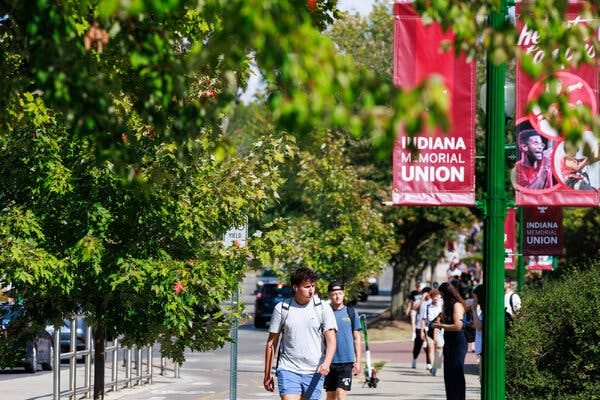
June 5, 2025
“The sweeping changes to Indiana’s public universities came suddenly this spring, with little time for debate.
Republicans passed a new law that would require university boards to measure the productivity of tenured faculty. Faculty were downgraded to ‘advisory only’ roles in university decision-making. Degree programs that graduated too few students would be closed.
And at Indiana University, whose flagship campus in Bloomington is ranked among the nation’s top 100 schools, the state’s governor was given new power over the school’s governing board.
The moves align with a conservative playbook to reduce faculty power on campuses perceived by many on the right as bastions of liberal thought. This year, several other Republican-led states passed laws requiring reviews for tenured faculty and the reorganization of programs at public institutions that have low enrollment.
Democrats, civil liberty groups and many university presidents have responded with outrage as the Trump administration has tried to force private institutions like Harvard and Columbia to give the federal government similar powers. Harvard’s leadership sued.
At Indiana University, the president, Pamela Whitten, has stayed silent on the state’s recent moves.
Many faculty members see the Indiana bill as an attack on their university’s independence and part of an effort to restrict their own freedom to teach and speak. They read Dr. Whitten’s silence as support for the changes.
‘In comparison to Harvard, the damage is very similar,’ said Heather Akou, an associate professor of fashion design at Indiana University Bloomington and the incoming president-elect of the Bloomington Faculty Council. ‘It’s just that it’s not as public and it’s being handled mostly within the state instead of by the federal government.’
Higher education leaders in other states have acted similarly.
Under pressure from the Trump administration, the University of Michigan eliminated the diversity, equity and inclusion efforts it once held up as a model. In Ohio, university leaders said little as lawmakers debated and then passed sweeping changes to higher education. The changes included prohibiting D.E.I. programs, creating a mandatory civics course and evaluating faculty members based on whether their classrooms were free of political bias.
Sometimes acquiescing has not been enough. Michigan’s former president, Santa Ono, lost out on his bid to become the University of Florida’s new president this week, even as he had disavowed diversity programs. But Republican leaders there said his handling of pro-Palestinian unrest on Michigan’s campus showed he was not dedicated enough to the conservative agenda.
Dr. Whitten’s supporters argue that she has been a savvy leader maintaining a good relationship with Republican state leaders. Some of those leaders say she is simply protecting her vision for the institution and preventing the school from becoming a target of lawmakers’ ire.
And for some on the right, a tense relationship with faculty is not a black mark against a university leader. Todd Huston, Indiana’s House speaker, praised her in an interview as ‘frankly the type of change agent Indiana University needed.’
Indiana University did not make Dr. Whitten available for an interview.
In a public statement after the bill’s passage, the university said in a statement that it was working to ‘ensure compliance with new laws.’ It added: ‘IU will continue to focus on its key priorities of championing student success, shaping research and innovation that improve the lives of Hoosiers, and strengthening communities across the state.’
Indiana’s experience has been emblematic of the pressures facing public universities. But several factors — an active protest movement on campus, a state with strong conservative leanings and Dr. Whitten herself, a leader at odds with many on her campus — have created especially tense conditions.
The flagship campus in Bloomington, which enrolls more than 40,000 students, has historically been known for its strong arts and humanities programs.
Now, many Republican lawmakers view that focus with suspicion, seeing these fields, with their courses on race and gender, as ideologically driven. Two years ago, for example, the legislature banned public funding for the Kinsey Institute at Indiana, an internationally renowned research center devoted to human sexuality.
And when pro-Palestinian students set up an encampment on the Bloomington campus in the spring of 2024, conservatives were disturbed by how similar it felt to what was happening at Columbia, in New York.
Dr. Whitten’s administration acted almost immediately. The university called in the Indiana State Police, which stationed snipers on rooftops and arrested 57 people, including a handful of faculty members.
Dr. Whitten and the faculty have long had a frosty relationship. Earlier that spring, more than 800 faculty member approved a vote of no confidence in Dr. Whitten. (More than 3,000 were eligible to vote.) The aggressive response to the encampment deepened professors’ anger. The local prosecutor’s office called the arrests ‘constitutionally dubious’ and dropped the charges.
But Dr. Whitten won plaudits from Republicans. Speaker Huston wrote a column in The Indianapolis Star praising her quick action to ‘maintain public order and ensure peaceful protests followed campus rules.’
Protests died down, but the discontent continued to brew.
In March 2024, the state enacted a new ‘intellectual diversity’ law. Dr. Whitten criticized it, saying it would put academic freedom at risk. Since then, at least two professors have been investigated over accusations that they had violated the law by making criticisms of Israel.
As the Indiana legislative session ramped up in January, the Trump administration was beginning to target universities. But higher education was not a major focus of the session in Indiana, until the changes appeared late this spring in the 220-page budget bill.
After a heated but brief debate, lawmakers approved it two days later.
‘It’s not unusual for a few new things to show up in a budget bill, but for something that significant, that comprehensive, to show up all at once at the very end of the process without any hearings or opportunity for public input was pretty staggering,’ said Representative Matt Pierce, a Democrat who represents Bloomington.
In the bill was a budget cut for state universities, of 5 percent over the next two years. Many on the Bloomington campus and beyond were just as upset by a provision that would remove seats on the governing board elected by alumni. The provision gave the governor full power to appoint the board, and removed a potential check on the school’s leadership. The governor has already dismissed the trustees elected by alumni.
One alumnus wrote a guest column in the student newspaper urging students to ‘transfer before it’s too late.’
Now, Indiana’s public universities are scrambling to figure out which of their programs have too few graduates and must be considered for reorganization or closure. At IU Bloomington alone, dozens of degree programs, particularly in the humanities, could be affected, according to an Indiana administrator.
The legislation reflects a broader trend as Republican state leaders argue that public colleges need to offer taxpayers better returns.
‘There’s this shifting mentality that the state is the owner of these institutions — it’s not the students, it’s not the alumni,’ said Isabel McMullen, a doctoral student at the University of Wisconsin-Madison who studies public university boards.
Benjamin Robinson, a professor of Germanic studies at IU Bloomington, who was arrested during a pro-Palestinian demonstration in the spring of 2024, said the new laws had scared and frustrated faculty members, and left them feeling unsupported by their administrators.
He is now separately facing an investigation for violating the intellectual diversity law, after he was accused of talking negatively about the state of Israel.
‘What she seems to have delivered up to the legislature is the autonomy of the institution,’ he said of Dr. Whitten.
Dr. Whitten’s supporters say many faculty members simply don’t understand the need for transformation. ‘Change is not always well received,’ Speaker Huston said.
Unlike some of her peers, Dr. Whitten’s position seems secure. This year, the board of trustees voted to raise her salary to $900,000 from about $700,000. And they extended her contract by five years, without waiting for the results of a tenure review scheduled for next year.
The only dissenting trustee was elected by alumni. But the governor has already removed that person from the board.” [New York Times]
University of Michigan using undercover investigators to surveil student Gaza protesters
Revealed: security trailing students on and off campus as video shows investigator faking disability when confronted
“The University of Michigan is using private, undercover investigators to surveil pro-Palestinian campus groups, including trailing them on and off campus, furtively recording them and eavesdropping on their conversations, the Guardian has learned.
The surveillance appears to largely be an intimidation tactic, five students who have been followed, recorded or eavesdropped on said. The undercover investigators have cursed at students, threatened them and in one case drove a car at a student who had to jump out of the way, according to student accounts and video footage shared with the Guardian.
Students say they have frequently identified undercover investigators and confronted them. In two bizarre interactions captured by one student on video, a man who had been trailing the student faked disabilities, and noisily – and falsely – accused a student of attempting to rob him….” Read more at The Guardian
SPORTS
Federal judge approves $2.8B settlement, paving way for US colleges to pay athletes millions
“A federal judge signed off on arguably the biggest change in the history of college sports on Friday, clearing the way for schools to begin paying their athletes millions of dollars as soon as next month as the multibillion-dollar industry shreds the last vestiges of the amateur model that defined it for more than a century.
Nearly five years after Arizona State swimmer Grant House sued the NCAA and its five biggest conferences to lift restrictions on revenue sharing, U.S. Judge Claudia Wilken approved the final proposal that had been hung up on roster limits, just one of many changes ahead amid concerns that thousands of walk-on athletes will lose their chance to play college sports.
The sweeping terms of the so-called House settlement include approval for each school to share up to $20.5 million with athletes over the next year and $2.7 billion that will be paid over the next decade to thousands of former players who were barred from that revenue for years.”
Read more at New York Times
GAME OF THE WEEK
Coco Gauff, top, and Aryna Sabalenka. Anne-Christine Poujoulat/AFP — Getty Images
“French Open, women’s singles final: The world’s top two players meet on the red clay of Roland Garros. No. 1 Aryna Sabalenka knocked out Iga Swiatek, the best clay-court player of her generation, en route to the finals. Sabalenka has been a force over the past few years, winning three Grand Slam titles. But all of those have come on hard courts. To win her first French Open title, she will have to beat No. 2 Coco Gauff — the sport’s biggest star and, as Matthew Futterman noted in The Athletic, the world’s highest-paid female athlete.
In his preview, Futterman predicted that the match would be a contest of two very different styles: Sabalenka’s aggressive attack, which seeks to end points quickly, against Gauff’s tireless defense, which aims to extend points until her opponent makes a mistake.” [New York Times]
THE WEEK IN CULTURE
Film and TV
Ana de Armas in “From the World of John Wick: Ballerina.” Lionsgate
“Ana de Armas stars as a dancer-assassin in “From the World of John Wick: Ballerina,” a movie that expands the John Wick cinematic universe. Our critic calls it a by-the-numbers cash grab.
Real masterpieces feature in “The Phoenician Scheme,” the latest film from Wes Anderson. Safeguarding them from the chaos of a film set was a challenge.
The documentary “And So It Goes” traces Billy Joel’s dramatic early years. Read takeaways.
Art
Adrien Brody and his mother, Sylvia Plachy, at his solo exhibition in Manhattan. Sam Hellmann for The New York Times
The Oscar winner Adrien Brody is also a painter, and he is putting on his first exhibition in a decade. Why now? ‘I’m an unemployed actor at the moment,’ he said.
The art of rediscovery: Dealers are increasingly turning to history’s forgotten talent to discover blue-chip stars.
More Culture
Nintendo released the Switch 2 this week. Its arrival reminded one writer of how getting back into Nintendo games helped heal his inner child.
It goes down in the DMs: For celebrities, Instagram has become an unexpectedly successful dating tool.
Taylor Swift didn’t get around to rerecording “Reputation” before buying back her masters. Thank goodness: Remaking that album could only make it worse, our critic writes.
After The Times published its annual picks for the 100 best restaurants in New York City, readers shared their own favorites. See them here.
Lonely Planet released its first L.G.B.T.Q. travel guide. The Times spoke with the guide’s author.” [New York Times]
ANIMALS
San Diego Humane Society
An unbearably cute rescue
“This darling 2-month-old black bear cub is on the mend, thanks to rescuers that are going to extremes to keep him wild. The sweetheart was found all alone in the Los Padres National Forest, clearly weak, with no sign of his mother. California wildlife officials sent the baby to the San Diego Humane Society, where his caretakers are dressing up in bear suits — big brown onesies with a realistic mask to match — so he doesn’t get acclimated to humans. There’s plenty for the young bear to learn, even at the rescue: There are trees to climb, nests to build, insects to sniff out. (He also sleeps on top of a large teddy bear that his rescuers think he considers his mom. Swoon!) This real-life teddy will stay with his carers for a year, until he’s old enough to be returned to the wild. And if you think this picture is too cute, then trust me — you’ll want to watch the video, too.” [CNN]
Khamploi Kakaew
An elephant shoplifting spree
“We need to address the elephant in the room — it’s right there, next to the ice cream freezer and the chips.
A wild elephant popped into a convenience store in Thailand for a quick treat, where it proceeded to sample a smattering of sweets at the front of the store — 10 bags of candy, dried bananas (what, no circus peanuts?). He was not hiding any baht, or Thai money, in his trunk, though a wildlife protection group later offered money to sponsor his shoplifting.
‘Business was a bit slow that day,’ store owner Khamploi Kakaew told CNN. ‘It was like it came on purpose.
The curious elephant is a familiar face in Khamploi’s neighborhood, which is situated near a national park. Plai Biang Lek, as the not-so-gentle giant is known, has raided a few stores and homes in town. He left relatively peacefully after his latest haul, with another elephant stationed outside (though, if that elephant was on lookout duty, it did a poor job).” [CNN]

